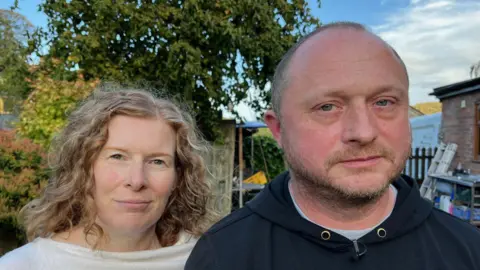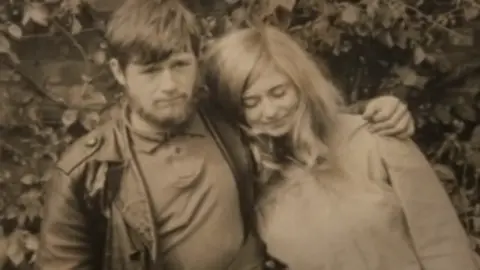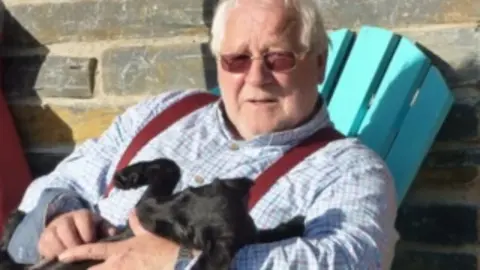Parents told son suicide plan on Christmas Day
 BBC
BBCA man whose parents took their own lives due to the pain of their illnesses has said he would consider doing the same unless assisted dying was legalised.
Tom Marshall's mother, who had Huntington's disease, and father, told their family they intended to take their own lives on Christmas Day 2020 and were found dead three days later.
Mr Marshall said he would look for "similar options" to his mother if he had the incurable genetic condition, which has a 50% chance of being passed on.
Proposals to give terminally ill people the right to end their lives were introduced in the UK Parliament earlier this month.
Later in Wales, Members of the Senedd will vote on whether to support a motion that would also give people "intolerably suffering" from incurable physical illnesses the same option.
The Senedd lacks the power to change assisted dying laws, so the vote would be in principle only, but campaign group My Death, My Decision said it would "shine the light" for law changes across the UK.
The Church in Wales is against changes to the law.
Mr Marshall's father, David, 75, who had severe arthritis, would be covered under the Senedd motion but not under proposals presented at Westminster.
Suzanne Marshall - known to friends and family as Russ - had contacted the Dignitas assisted dying clinic in Switzerland, but chose not to proceed because she would have had to end her life "prematurely".
She also did not want to put anyone else at risk of prosecution for helping her.
Her condition deteriorated towards the end of her life, leaving her in extreme pain and with difficulty swallowing.
Mr Marshall said his father was her carer but in "enormous pain" from arthritis and did not want to live without his wife of 54 years.
The couple, from Llanddoged, Conwy, told Mr Marshall and his wife Dawn that they no longer wished to live on Christmas Day 2020, but left no details of how or when they would end their lives.
 Tom Marshall
Tom MarshallOn 27 December, Mr Marshall, from Nantglyn, Denbighshire, received a message asking for him and his wife to visit his parents' home the next day
Ms Marshall said they still "didn’t know it was actually going to happen until we got there and found them".
They said they believed the couple were "brave" for making the decision they did, saying it was "harder for them than us".
Ms Marshall said: "It’s not an easy death but it was one that they had dignity for. But it’s not a safe death, forcing people to suicide. It’s not safe and it’s really, really lonely.
"So, whilst we were fortunate enough to be told and start to prepare for it they had to do that on their own. We couldn’t go and say goodbye.
"They couldn’t tell us exactly when they were going to do it. They couldn’t say goodbye in any sort of nice and safe way."
 Tom Marshall
Tom MarshallMr Marshall, 48, does not want to know yet if he has Huntington's, saying: "I would sooner not know and not have a fear of what might be ahead if I do have it."
He added: "If I end up in the same situation as my mother I’ll be looking for similar options. And whether there’s a legal route to do that, great – otherwise I’ll be looking for options."
He and his wife said they understood the arguments and concerns against assisted dying, but believed people should have a choice, subject to medical and legal safeguards.
The Church in Wales claims vulnerable people would be put at risk if assisted dying was legalised.
Its bishops said there was "abundant" evidence assisted dying could "swiftly lead to bad and unintended outcomes" and "to the devaluing of all human life".
In a statement, the church called for the "extension of the best possible palliative care to all who require it".
The motion in the Senedd was submitted by Labour MS for Cardiff North, Julie Morgan, and calls for adults of sound mind who are "intolerably suffering from an incurable, physical condition and have a clear and settled wish to die should have the option of an assisted death, subject to robust safeguards".
Trevor Moore, of My Death, My Decision, said: "This debate will be about a law for people who are intolerably suffering from incurable conditions, not one limited to people who are terminally ill.
"It’s important that people who are suffering from conditions like multiple sclerosis, Parkinson’s and locked-in syndrome are not ignored."
If you've been affected by issues in this story, help an support is available via BBC Action Line
